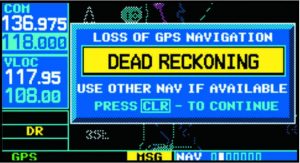The Global Navigation Satellite System is amazing. It allows us profound situational awareness and navigational guidance. However, it is so pervasive and reliable that many pilots have forgotten the basics of pilotage, dead reckoning and how to use the non-subscription-based radio navigation aids available on the ground.
The need to stay proficient in pilotage by being able to interpret what is seen on a sectional chart and correlate that into the world seen outside the windscreen is critical to safe flight.
Many pilots rely so heavily on the GPS and the magical ‘magenta line’ that it has become a meme:

The GPS system is more fragile than almost everyone realizes and we are just one good solar flare away from the global GPS system becoming crippled or completely unusable until replacement satellites could be launched and re-orbited. Space junk is another threat, but will typically not cripple multiple satellites at once, just affect positional accuracy and reliability for a while. Another frequently recurring issue is the military jamming GPS for their training purposes, which will affect all pilots in a wide area, not just military pilots.
NOAA provides a Space Weather and GPS status monitoring page here to see what solar and atmospheric impairments may exist and affect the system.
If any of this sounds like fantasy and fearmongering just take the recent Starlink satellite failures on February 3rd, 2022 which were the result of a solar storm that pushed about 40 of the satellites back into the atmosphere, burning up on re-entry.
Relying on GPS and airplane automation has become such a problem in decades past through today that airplanes have crashed and hundreds of people have died because the pilots didn’t understand why their systems failed and then they failed to simply fly the airplane.
The term “Children of the Magenta Line” comes from the 1997 speech from American Airlines captain Warren Vanderburgh discussing the overreliance of automation by pilots who forget the basics. Another example of this occurred on May 31, 2009 when an Air France flight crashed killing 216 people.
What would your reaction be if your GPS simply failed from jamming, loss of reception from a couple satellites reducing its accuracy or the antenna cable became disconnected in flight rendering it useless?

As a pilot you can increase the safety of yourself and passengers by maintaining proficiency with a sectional chart and those free-to-use VORs/VORTACs. Also, take the initiative to go flying with a CFI from time to time. Those flights can be educational, fun and then applied toward your WINGS account and reset the clock for your flight review.
As I’ve learned from others in the past and tell my students now, “Use all the tools available to you, but never forget to ‘aviate, navigate and communicate’ – in that order.”
